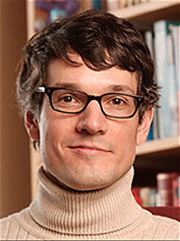
Paul Cobb appreciates the power of perspective.As a historian, its central to his discipline. As a historian of Christian/Muslim relations in a post-9/11 world, its a teaching tool he brings to class thats as important as pen and paper.
One of the classes the Notre Dame associate professor of history teaches is a University seminar titledGetting Crusadedan examination of the medieval Crusades as seen through the eyes of those who were, well,crusaded.
The Crusades are a natural laboratory for appreciating historical perspective,Cobb said.In my seminar, we cover the traditionalstory of the Crusadesfrom the perspective of Catholic Europe, and then, one by one, we attempt to reconstruct how Jews, Middle Eastern Christians, and Muslims will have understood those same events.
Clouded by controversy for centuries, the Crusades – which were conducted from 1095 to 1291 – have been portrayed either asholy warsagainst Islam to liberate Christian holy places, or as brutal, unprovoked attacks by paranoid, religious fanatics.So which were they? That, of course, depends on ones perspective
The point of the course is to get freshmensometimes straight out of high schoolto grapple with two issues central to the historical discipline: how to handle narrative and how to appreciate perspective.
The vast majority of sources produced in the Middle Ages about the Crusades, whether by Muslims or Christians, are narratives. They are literary re-tellings of what happened, not documents as such. They reflect the attempt by an author to craft a storyabout an event. Students are taught to pay attention to plot devices, rhetoric, character stereotypes and development, and any axes that are being ground.
Cobbs latest book, to be published this month, is a biography of an eyewitness to the Crusades, a medieval Muslim from Syria named Usama, whose memoirs Cobb first discovered as an undergraduate in an Arabic class.After revisiting those memoirs – which were rich with details about Usamas family – he began writing a history of the clan.
The memoirs were tough to understand, but very funny and moving,Cobb said.I subsequently learned that Usama, who was quite famous in his day as a poet and warrior, was from an aristocratic family of some notoriety in medievalSyria.
TitledUsama ibn Munqidh: Warrior-Poet of the Age of Crusades(Oxford: Oneworld, 2006), the book is the first biography in English of Usama. The family castle still stands inSyria, and additional research for the book took Cobbinto all sorts of fascinating texts and strange locales inSyria,Lebanon,JordanandEgypt.
The work would have been daunting for some, but not for a scholar who speaks Arabic, Persian, Greek, Syriac, French, German andenough Turkish and Italian to sweet-talk the archivists. **
In addition to the biography of Usama, Cobbs research has spawned other projects: the family history and a new English translation of Usamas famous memoirs for Penguin Classics titledIslam and the Crusades: Usama ibn Munqidh and Ibn Jubayr.
Im most energized by the ways in which my teaching informs my research and vice-versa,he says.So on the distant, distant horizon, a book based ** on Getting Crusadedmay be in the works.
TopicID: 15863